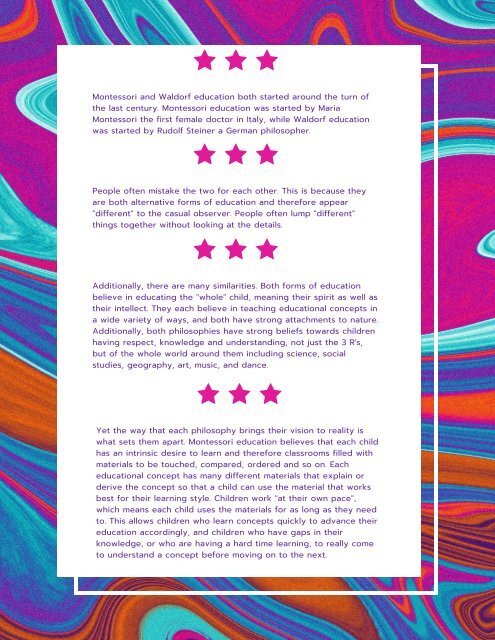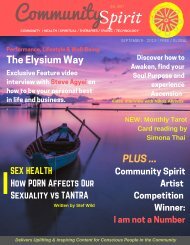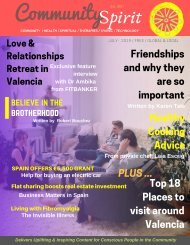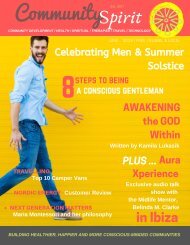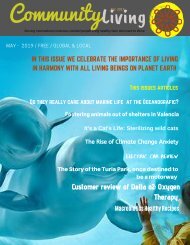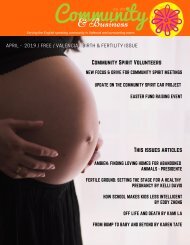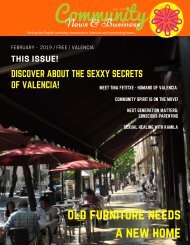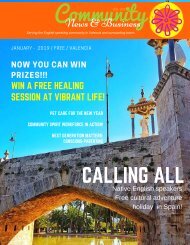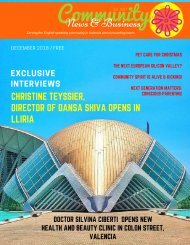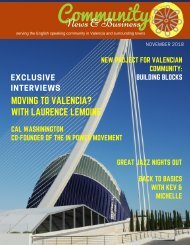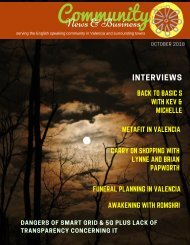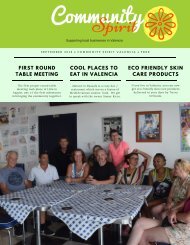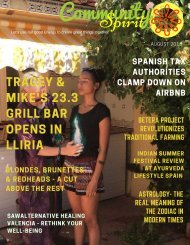Community Spirit ezine - August 2019
The theme of August issue is 'The Importance of Self Discovery'. Community Spirit is an international ezine that delivers uplifting and inspiring content for conscious people in the community. Sections cover: Sex Health, Big Clean Up, Supporting Local Communities to Thrive, Health Matters, Next Generation Matters, Business Matters, Spiritual Reality, Hidden Gems, Travel & Holidays, Animal well-Being, Technology Upgrade and much more... Written articles and videos. International free monthly eMazine for English speaking people interested in living healthy lives, supporting people in the community to thrive. It is best read relaxing with a coffee or tea and reading it on a Tablet, Laptop or Desktop.
The theme of August issue is 'The Importance of Self Discovery'. Community Spirit is an international ezine that delivers uplifting and inspiring content for conscious people in the community. Sections cover: Sex Health, Big Clean Up, Supporting Local Communities to Thrive, Health Matters, Next Generation Matters, Business Matters, Spiritual Reality, Hidden Gems, Travel & Holidays, Animal well-Being, Technology Upgrade and much more... Written articles and videos. International free monthly eMazine for English speaking people interested in living healthy lives, supporting people in the community to thrive. It is best read relaxing with a coffee or tea and reading it on a Tablet, Laptop or Desktop.
- TAGS
- coco-bliss
- tantra-amsterdam
- tantra-valencia
- tantra-ibiza
- amsterdam-conscious-community
- valencia-yoga
- yoga-valencia
- ibiza-conscious-community
- valencia-conscious-community
- richart-llover
- richart-voller
- how-to-see-auras
- aura-painter
- aura-painting-experience
- aura-painting
- healthy-lifestyle
- spiritual-community
- conscious-community
- community-spirit-ezine
Create successful ePaper yourself
Turn your PDF publications into a flip-book with our unique Google optimized e-Paper software.
Montessori and Waldorf education both started around the turn of<br />
the last century. Montessori education was started by Maria<br />
Montessori the first female doctor in Italy, while Waldorf education<br />
was started by Rudolf Steiner a German philosopher.<br />
People often mistake the two for each other. This is because they<br />
are both alternative forms of education and therefore appear<br />
"different" to the casual observer. People often lump "different"<br />
things together without looking at the details.<br />
Additionally, there are many similarities. Both forms of education<br />
believe in educating the "whole" child, meaning their spirit as well as<br />
their intellect. They each believe in teaching educational concepts in<br />
a wide variety of ways, and both have strong attachments to nature.<br />
Additionally, both philosophies have strong beliefs towards children<br />
having respect, knowledge and understanding, not just the 3 R's,<br />
but of the whole world around them including science, social<br />
studies, geography, art, music, and dance.<br />
Yet the way that each philosophy brings their vision to reality is<br />
what sets them apart. Montessori education believes that each child<br />
has an intrinsic desire to learn and therefore classrooms filled with<br />
materials to be touched, compared, ordered and so on. Each<br />
educational concept has many different materials that explain or<br />
derive the concept so that a child can use the material that works<br />
best for their learning style. Children work "at their own pace",<br />
which means each child uses the materials for as long as they need<br />
to. This allows children who learn concepts quickly to advance their<br />
education accordingly, and children who have gaps in their<br />
knowledge, or who are having a hard time learning, to really come<br />
to understand a concept before moving on to the next.


